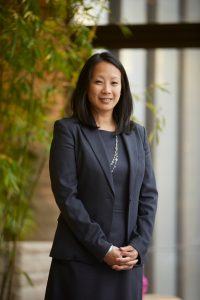
With federal dollars for cancer research dwindling, physician Kimmie Ng turned to a surprising source of revenue for a clinical trial.
Kimmie Ng, MPH ’07, had an intriguing question: Do vitamin D supplements help patients with metastatic colorectal cancer stave off progression? She had the scientific means to get the answer: a rigorous double-blind, randomized clinical trial of 139 patients at six cancer centers plus their associated community affiliates around the country. What she didn’t have: enough money to bring the pioneering study to fruition.
So in 2014, Ng, director of clinical research in the Gastrointestinal Cancer Center at the Dana-Farber Cancer Institute in Boston, launched an appeal through Consano, a national nonprofit crowdfunding platform that gives 100 percent of the donations to the researcher. Within a year, Ng raised $25,000—just enough to finish analyzing the data from her pioneering prevention trial. The Consano-funded clinical trial was the foundation of Ng’s subsequent proposal for a highly coveted Research Project Grant, or R01, from the National Cancer Institute for further exploration of the topic. R01s are considered the National Institutes of Health’s (NIH’s) “bread-and-butter” grants for investigators. Ng was awarded an R01—her first—this past March.
Ng, who now serves on Consano’s board, recently discussed the pros and cons of crowdfunding medical research with Harvard Public Health editor Madeline Drexler.
Q: What spurred the Consano study?
A: It’s been well known in the laboratory that vitamin D has anticancer properties; in mouse models of colorectal cancer, vitamin D prevents cell proliferation. The vitamin D receptor, which triggers the activity of vitamin D, is also expressed in colorectal cancer cells. And the enzyme that converts the circulating form of vitamin D to the active form is present in colorectal cancer cells. All of those facts led to the hypothesis that vitamin D may be involved in colon cancer initiation and progression.
Epidemiologic studies also supported this idea. The incidence and mortality of a number of cancers— colorectal, breast, prostate, and pancreatic—are much higher in regions of higher latitude, where people get less UVB exposure and are therefore less likely to make vitamin D in the body. That dovetails with studies that have linked higher plasma levels of vitamin D to longer colon cancer survival— work that originated in the Nurses’ Health Study and the Health Professionals Follow-Up Study.
We needed to bring all these observational findings to the next step and do a randomized clinical trial to look at cause and effect: whether vitamin D has a causal role in improving the outcome of colon cancer patients.
Q: One would assume this kind of study would readily draw funding.
A: It doesn’t. It’s tough to get funding for a clinical trial of a drug like vitamin D, because it’s not profitable for a company. We managed to cobble together funding from a variety of different organizations, but in the end, it wasn’t enough. A study like this costs nearly $1 million.
Q: What were the results of your study?
A: Everyone in the trial—previously untreated metastatic colon cancer patients—received standard chemotherapy. Control-arm patients got a low dose of vitamin D—400 units per day—in addition to chemotherapy. People in the investigational arm got much higher doses—8,000 units per day for two weeks, and then 4,000 units per day, in combination with chemotherapy.
The patients receiving high-dose vitamin D survived significantly longer without progression of the disease. There were no added side effects of the high doses of vitamin D. And people getting the high doses had less severe diarrhea, so vitamin D potentially made chemo more tolerable.
Q: What are the keys to pulling off a crowdfunding venture?
A: Studies that have a clear translational impact, that obviously affect patient care or change the course of cancer treatment, will have appeal. Basic research on a particular enzyme or cell—something far removed from the clinic—may have more of a challenge. In my training and career, I’ve had to learn how to speak to a lay audience and how to convey the importance of the work that we’re doing in relatable terms. This is a critical skill—not just for crowdfunding but to effectively communicate results and ideas in general to the public. I put a lot of personal stories in my materials. They are what inspire me.
Q: To help researchers predict their likelihood of getting a grant, the NIH publishes paylines, or percentile cutoffs, up to which the agency is expected to fund grant applications. The National Cancer Institute has the lowest payline of any NIH institute— the 10th percentile, a threshold that has been steadily declining. Does this dismal picture weigh on scientists?
A: Yes, a lot. It has driven people out of the field into either clinical practice or industry. We are losing talent as a result of these strict funding parameters. And because we’re losing talent, promising and innovative ideas are not being pursued. The larger problem with a social media fundraising campaign is that it’s discrete, you can only raise so much, and it’s a one-shot thing, whereas the National Cancer Institute will invest in you over a five-year period. To have a stable source of support for that long is huge, because research leads you in different directions all the time, which in turn leads to new discoveries and new advances.
If the NIH payline keeps dropping, it will affect our country’s status in the world in terms of advances in cancer research. And patients will suffer—they really will.







